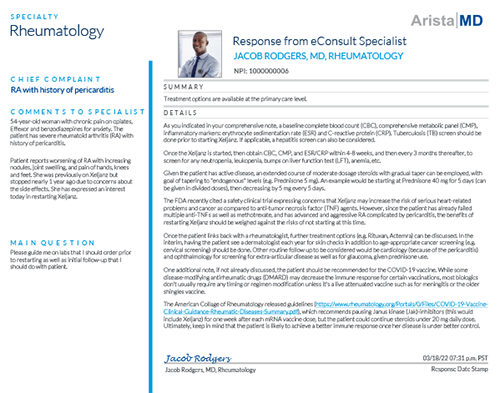With long specialist wait times, providers across the country are turning to eConsults to offer comprehensive rheumatology care. They often help patients manage chronic conditions like rheumatoid arthritis while dealing with the realities of limited access to specialists. Specialist shortages, limited access, and long wait times for specialty care can negatively impact patient outcomes.
Electronic physician-to-specialist consultations, or eConsults, can help mitigate the challenge of specialist shortages and other delays in treatment by offering comprehensive rheumatology care. An eConsult is an asynchronous physician-to-physician communication about a patient, conducted over a secure digital platform, that enables PCPs to leverage the expertise of physician specialists like rheumatologists. eConsults gives patients immediate access to specialists from within a primary care setting.
Below, we use rheumatoid arthritis, a disease that affects about 1.5 million US adults, as an example of how eConsults can help PCPs work with specialty physicians to manage a chronic, complex disease.
Over half of practicing rheumatologists are expected to retire over the next 15 years.
How eConsults Help with Comprehensive Rheumatology Care
Diseases like RA can be difficult to diagnose since severity and symptoms vary from patient to patient. With RA, there are 6 commonly-used tests that rheumatologists use to diagnose the disease. Working with a rheumatologist is important for accurate diagnosis and staging. But timely access to a rheumatologist can be challenging due to a shortage of rheumatologists, high demand, and the resulting long wait times for consults.
In 2018, the American College of Rheumatology announced this shortage was at crisis levels, with over half of practicing rheumatologists expected to retire over the next 15 years. At the same time, early diagnosis and aggressive treatment are key to better patient outcomes, so access to comprehensive rheumatology care is incredibly important as early in the disease process as possible.
eConsults can help PCPs quickly and effectively connect their patients with specialists when access to care is limited. Medical records, lab results, imaging and other important documentation can be securely shared and stored within the eConsult platform. When using an eConsult platform, Patients don’t need to be seen in person by a specialist to get the testing process started. They can continue to receive care locally from their PCP.
After Diagnosis, eConsults Facilitate Continuity of Care
Once a disease like RA has been diagnosed and a treatment plan determined, the specialist can co-manage the condition with the PCP and act as a consultant with the help of eConsult technology.
eConsults make it possible to maintain continuity of care by enabling PCPs to communicate asynchronously with specialists who provide documented guidance and oversight in a safe and secure environment.
Additionally, eConsults can effectively replace informal curbside consults, which don’t allow for accurate patient documentation, follow-up, or specialist reimbursement.
Shorter Wait Times, Better Outcomes
Long wait times to see a specialist can delay treatment for chronic conditions like RA. Delays can lead to poorer outcomes or hospitalization. With RA specifically, delaying treatment increases the likelihood that patients will experience joint damage and disability within two years of diagnosis.
eConsults make it possible for PCPs to more quickly diagnose RA (versus other joint issues or forms of arthritis) and start treatment sooner. eConsults also allow rheumatologists to educate PCPs about what specific tests to order based on the individual patient’s symptoms. Results can help the PCP choose the course of care/treatment with specialist oversight.
eConsults Offer Better Documentation
With eConsults, PCPs can document the entire diagnosis and treatment process, eliminating gaps in the patient record and allowing a detailed patient history to be shared with the specialist. Access to the file allows the specialist to review the patient’s complete history and determine the course of treatment without the pressure of immediacy (as seen with curbside consults).
Documentation enables PCPs and specialists to maintain patient records consistently. It also facilitates treatment guidance, which helps ensure a higher degree of patient safety and better outcomes.
Unlike curbside consults, eConsults allow specialists to obtain reimbursement for services. In 2019, CMS reimbursement changes included the expansion of benefits for telehealth platforms and eConsults. Private insurers are also increasing the number of services they cover. Various states have issued mandates that require private insurers to increase access to telemedicine, limit cost sharing for telemedicine services, and reimburse doctors for telemedicine at the same rate as in-person services.
Redirect Resources Appropriately
One of the biggest benefits that eConsults offer PCPs and specialists is the ability to manage low-acuity patients quickly in a primary care setting. This helps free up specialists’ time to see patients who need more complex care.
Resource management is extremely important when a disease is difficult to diagnose. Rheumatoid arthritis typically requires six different blood tests and a thorough evaluation of symptoms to diagnose. While it can be difficult to diagnose rheumatoid arthritis in a primary care setting with no outside input, the average wait times to see a rheumatologist are as high as 45 days. eConsults mitigate both challenges.
eConsults can reduce delays in diagnosing and treating a patient’s condition by providing faster access to specialists, often within 24 to 48 hours. eConsults make it easier for patients to gain access to a specialist and have their condition evaluated in a shorter time frame. Using eConsult technology to work closely with specialists to diagnose, treat, and manage a chronic disease or condition, PCPs can help improve care outcomes for patients needing specialty oversight.


